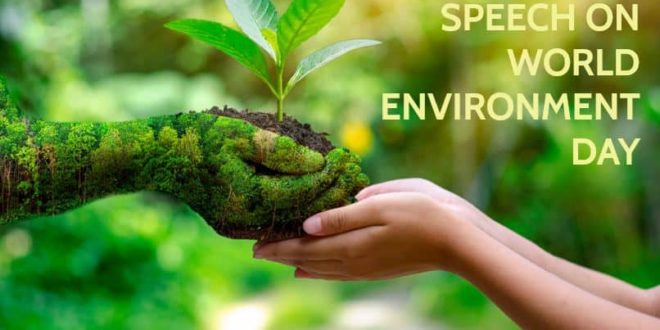World Environment Day is celebrated on the 5th of June every year. It is celebrated to raise awareness and to take actions to conserve the environment
The theme of this year’s World Environment Day, “Only One Earth”, is a simple statement of fact.
This planet is our only home. It is vital we safeguard the health of its atmosphere, the richness and diversity of life on Earth, its ecosystems and its finite resources. But we are failing to do so. We are asking too much of our planet to maintain ways life that are unsustainable. Earth’s natural systems cannot keep up with our demands.
This not only hurts the Earth, but us too. A healthy environment is essential for all people and all 17 Sustainable Development Goals. It provides food, clean water, medicines, climate regulation and protection from extreme weather events. It is essential that we wisely manage nature and ensure equitable access to its services, especially for the most vulnerable people and communities.
More than 3 billion people are affected by degraded ecosystems. Pollution is responsible for some 9 million premature deaths each year. More than 1 million plant and animal species risk extinction, many within decades.
Close to half of humanity is already in the climate danger zone – 15 times more likely to die from climate impacts such as extreme heat, floods and drought. There is a 50:50 chance that annual average global temperatures will breach the Paris Agreement limit of 1.5 degrees Celsius in the next five years. More than 200 million people each year could be displaced by climate disruption by 2050.
What is the strongest force?
If you are a lay person, you will say gravity. If you are a high school graduate, you might say electro magnetism. If you are a physicist, you might say nuclear, because it binds the fundamental particles of matter together to form larger particles, 6 thousand trillion trillion trillion (that is 39 zeroes after 6!) times stronger than the force of gravity.But you will all be wrong Because the strongest force in the world is the force of nature. Nature contains us all.
We are nature tagged in a massive machine playing our parts. We are more than our parts, we as a race think we can escape its pronouncements. Skip its rulings, see past its guards. It gives no considerations to wants or needs, feelings or sentiments. We think we can steal away from it and come away with its bounty without consequences. But it contains us, from our beginning to our end. The biological imperative that all organisms must survive to seek food, water, shelter, to procreate is the only reasonable, all set to the crushing power of nature.
Yet even with our resolute will to survive, nature will end us because that is its law. Death is inevitable, extinction just another of its rules. Another part of the life cycle of the very old world churning its energy. There is no escape from the inescapable. It makes its choices for us. Nature has its share of man’s decisions to hasten its process to end us. Our contributions towards carbon emissions gradually increasing global temperatures resulting in global warming and its associated consequences.
Think tank Future Agenda estimates that more than 270 million tonnes of plastic waste is generated worldwide each year and a total of 8 million tonnes of plastic waste leaks into the ocean each year.
Ellen Macarthur foundation concluded in 2015 that, by 2050 there will be more plastic than fish in the ocean if we do not take urgent, collective action.
Industrial plastic production has grown rapidly since the 1950s, reaching 368 million tons globally per year by 2019.
Within this same period Ghana has had a total of 950,000 metric tons of plastic waste and currently 1.1 million tons (approximately 5% of that is collected for recycling) according to UNDP report. Because of its low price, plastic has become one of the most widely used materials, especially in the packaging industry, and now forms an integral part of municipal waste in Ghana.
Every year, 19–23 million metric tons of mismanaged plastic waste are transferred from land- based sources to water globally, and Ghana have had its fair share of water pollution based on plastic wastes. Drains are chocked, water species are polluted and effects transfered to humans when ingested.
In 2019, the Government of Ghana officially became the first African partner of Global Plastic Action Partnership (GPAP). During the launch, the President pledged to achieve zero plastic leakage into Ghana’s ocean and waterways, saying: “Ghana, after this process, will make best efforts to be a model for other countries in the region and on the continent on issues related to plastic management.”
The race to recycle is gaining momentum in Ghana, which is left with a financial burden of $290 million annually due to waste mismanagement. This makes it more difficult to clean our environment and requires more efforts and commitment from the government and citizens to meet our sanitation challenges. Wetlands are chronically encroached whiles drains are historically drowning in silt awaiting floods without rains.
Remote sensing technologies provides empirical evidence of protected forest depletion in Ghana. Research conducted by Amoah, A. and Korle, K. (2020) shows that in 1999, the Forest Plantation Development Fund was established to support the private sector with funding for commercial forest plantation investment.
In 2002, the public sector was included in forest plantation development. A year before this amendment (2001), the National Forest Plantation Development Programme (NFPDP) was launched. This was relaunched in 2010 with the aim of promoting tree planting of about 30,000 ha per year in all administrative municipals of Ghana.
In spite of the local, national, regional and international efforts towards preserving Ghana’s forest resources, it is estimated that net forest depletion which was valued at US$1.578 bn in 2010 has risen to US$3.134 bn in 2017 (World Bank, 2019). This shows a net forest depletion of over 98% from 2010 to 2017. The only ecological integrity within Accra, the Achimota forest reserve located within the heart of Accra, over the years have witnessed massive depletion since 1927. In line with meeting the Sustainable Development Goals, this trend provides a worrying situation that needs urgent attention.
Results show that human behaviour, climate change and institutional failure are the main driver intensities of forest depletion in Ghana.
The way forward is leadership commitment and involving children to change the world. This is most significant to achieve sustainable development by preserving our natural resources in the interest of our future generations, not just our natural environment but the roles we play as inhabitants of the earth. It is time to educate the children of today so that they can see the value in what we have tomorrow.
In short accept the wind.
Because nature always wins.
By
Mr. Emmanuel Adu Boateng
Environmental Activist
Source: MyGhanaMedia.com

Send your news stories to myghanamedia@gmail.com and Chat with us via WhatsApp on +233 200818719
 MYGHANAMEDIA.COM Best Source Of Latest News
MYGHANAMEDIA.COM Best Source Of Latest News




